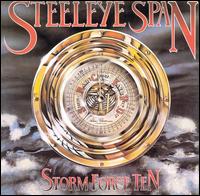- Storm Force Ten
Infobox Album |
Name = Storm Force Ten
Type =Album
Artist =Steeleye Span

Released = 1977
Recorded = 1977
Genre =Electric folk
Length = 41:55
Label = Chrysalis
Producer =
Reviews = *Allmusic Rating|4|5 [http://www.allmusic.com/cg/amg.dll?p=amg&sql=10:7umyxd7b8oly link]
Last album = "Rocket Cottage " (1976)
This album = "Storm Force Ten" (1977)
Next album = "Live at Last" (1978)"Storm Force Ten" is an album by the
electric folk bandSteeleye Span , the band's 10th effort, released in 1977.The album was the band's last production to reach the charts, topping out at 191 on Billboard's Pop charts. After "
Rocket Cottage ", Bob Johnson and Peter Knight left the band. As there was still a contractual obligation, they invitedMartin Carthy back again. Back in 1971 when Martin Carthy had joined he had recommendedJohn Kirkpatrick but they decided on fiddler Peter Knight instead. This time they accepted his recommendation and Kirkpatrick's fiery accordion playing replaced Knight's fiddle.John Tobler writes on the 1996 reissue of "Storm Force Ten"::"Steeleye's ninth original LP, 'Rocket Cottage' was released in late 1976, and appeared only weeks before 'Anarchy in the UK', their debut single by The Sex Pistols, which may have contributed to the less than spectacular chart showing of the Steeleye LP. It was again produced by Mike Batt, but when the follow up to a Top 10 album fails to reach the Top 40, something is amiss."
In 1974, Ian Anderson of Jethro Tull had been the producer of Steeleye Span's "Now We Are six". In February 1977, Tull had released "Songs From the Wood", their most folky album to date. Just as Tull were starting to record "a cappella" sections in songs ("Ring Out, Solstice Bells"), Steeleye were recordings spiky guitar riffs (Sligo Maid), bringing the two bands closer than ever. "Storm Force Ten" reversed that trend.
The title may refer to the fact that "Storm Force Ten" is their tenth album or it may be a reference to tensions the band was experiencing after producing 10 albums in just 7 years and performing almost continuously during that period.
Mike Batt pressured the band to record "Rocket Cottage" in only one week. The band nominally broke up after the album was released. Shortly after the album was released vocalistMaddy Prior released her first solo album.The band had occasionally sang quite long songs - "Long Lankin" on "Commoner's Crown", "The Victory" here, and "Montrose" (over 15 minutes) on their next (live) album. Arguably "The Victory" is the best of their long tracks because of the masterful variations in tempo, instrumentation and choice of voices. The biggest surprise was the inclusion of two
Brecht songs. Martin Carthy had sung "Wife of the Soldier" on "Byker Hill ", using Brecht's words, but the music of Johnny Scott instead of the original music byKurt Weill . The same arrangement is used here.PJ Harvey later recorded it, as did theOysterband andMarianne Faithfull . "Pirate Jenny " (The Black Freighter) had been recorded byJudy Collins in the 60's and it was later to be sung byBarbara Dickson . Maddy gives these two Brecht songs an appropriate flavour of cynicism. According to Hugh Fielder in the pop paper "Sounds" in 1977, there is an uncredited musician here - Mike Batt playing synthesizer.The album is unusual in that it is the only Steeleye album that does not use a
fiddle at all. Instead John Kirkpatrick playsaccordion , giving the whole album a very distinct sound from the rest of the band's output. No other Steeleye studio album features an accordion, although "Hark! The Village Wait " features aconcertina on several songs.Personnel
*
Maddy Prior (vocals)
*Tim Hart (vocals,guitar )
*Martin Carthy (vocals,guitar )
*Rick Kemp (bass guitar , vocals)
*John Kirkpatrick (vocals,accordion )
*Nigel Pegrum (drum s)Track listing
# Awake, Awake ("Traditional] ") – 5:07
#: A love song derived from theSong of Solomon .
# Sweep, Chimney Sweep ("Traditional") – 4:44
#: This is from the Copper family, here sung a capella.
# The Wife of The Soldier ("Brecht, Scott") – 2:40
#: An anti-war song, a sentiment also on "Fighting For Strangers" on the previous album.
# The Victory ("Traditional") – 8:37
#: First published by John Ashton ("Modern Street Ballads") in 1888. According to Roy Palmer this is a re-writing of a ballad about General Wolfe.
# The Black Freighter ("Brecht, Weill") – 5:59
#: A barmaid in "The Threepenny Opera " has a fantasy about cutting rich men down to size.
# Some Rival ("Traditional") – 3:23
#: This beautiful love song is possibly as old as 1656. Maddy sings it with a gentle acoustic guitar accompaniment. It is also known as "Some Tyrant" and "A Rival Heart" (Roud 587).
# Treadmill Song ("Traditional") – 6:11
#: Treadmills were used in English prisons from 1779 to 1902. This was first written down in 1906 in Somerset. also known at "The Gaol Song" or "Durham Gaol" (Roud 1077)
#Seventeen Come Sunday ("Traditional") – 5:09
#: An early version of this song is byRobert Burns (1792). A tale of very young love. (Roud 277)
Wikimedia Foundation. 2010.
